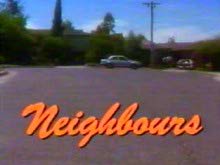|
.
Comment
> Going Through the Change
by Rhys
Only last week, Neighbours’ 4,500th episode was broadcast in Australia, and on March 18th 2005, Neighbours will celebrate its twentieth birthday; twenty years that have admittedly flown by with alarming speed. However, those twenty years of Neighbours have brought with them great change - change in the understanding of what a serial drama can encompass; a change in the perception people have of Australia and its broadcasting industry as well as a number of other developments which can be attributed to the success of Neighbours globally.
|

|
Firstly it is rather appropriate to quote the best selling author, Bill Bryson, from his novel ‘Down Under’, chronicling his visits to Australia as an American journalist: "Hands up, all those who can name the current Australian Prime Minister or say in which state you will find Melbourne or answer pretty much any antipodean question at all not involving cricket, rugby, Mel Gibson or Neighbours" (Bryson, ‘Down Under’, 2000). That brief passage sums up pretty much how little the outside world knows about Australia, and shows how much less we would have known about it prior to Neighbours. In short, Neighbours has almost certainly increased both our awareness and interest in that island continent on the other side of the world, and the reason can be attributed to many factors. Firstly, Neighbours set out to present the suburban world of Australia, seeking to dispel the belief that Australia was all vast desert and waterholes in the sand. As is seen on screen in the fictional Erinsborough, the trees are green and lush, the roads far from being dirt tracks are newly tarmacced, and the people you will encounter are smart, though casually dressed, without a cork hat in sight.
|

|
Put simply, Neighbours has brought about a change long overdue in the rest of the world’s understanding of what Australia is, and what it means to be Australian. Sure, the sun does shine around 90% of the time on Ramsay Street, and this is more than anything else a deliberate move by the programme to try and uphold at least a little of the previous held myth that Australia is always warm and bright, whilst throwing in the odd shower to prove that it does rain occasionally! In setting the antics of the neighbours in cosmopolitan Melbourne, Neighbours had the perfect opportunity to introduce a broad range of characters, showing us that Ramsay Street was little different to any suburban street in the United Kingdom or in the rest of the world. Indeed, the original premise with Neighbours was to present the street as being representative of any suburban cul-de-sac in the world. In other words, there wasn’t a conscious move to advertise Neighbours as being “Australian”, but rather so that Ramsay Street could easily be located in any country. Granted, as the popularity of the programme has soared, so has the pride the show takes in it being Australian, and it has transpired that much of the programme’s appeal lies in its Australian-ness.
Before Neighbours’ arrival on the BBC in 1986, Australian programming had made little impact in the UK, or anywhere else in the world for that matter. Yet, for all the criticism levied at Neighbours over the years, it has undoubtedly done the unimaginable for Australian broadcasting and the respect it can now command around the world. Neighbours’ phenomenal success abroad enabled the launch of the rival Home and Away at the end of the eighties, and despite attracting large numbers of teen viewers with its cast of good-looking beach bums, it has failed to capture the hearts of viewers in the same way Neighbours has, and certainly hasn’t managed to appeal to anywhere near the same cross-section of fans that our friends in Ramsay Street manage. Coronation Street, for years, monopolised the soap opera genre on British television screens, until in 1985 a new drama set in the grim East End of London came to the BBC - EastEnders. Coronation Street quickly upped its ante with tougher storylines in a bid to compete with the new arrival. Neighbours, however, sailed on its merry way, ultimately picking up fans who had become disillusioned with Corrie and people who wanted something lighter than EastEnders. Neighbours’ appeal, especially in Britain, laid in its ‘perfect blend’ of 1/3 drama, 1/3 romance and 1/3 comedy. Characters were likeable, morally guided, and attractive, while the programme rarely shocked. It was safe viewing following Children’s BBC as of 1988 and quickly grew an army of family viewers, drawn to it by its mixed cast of children, teens, adults and the elderly.
|

|
Broadcast twice a day, five times a week gave Neighbours an instantly unique position in the TV schedules, and one must only look at the subsequent programmes to have tried to capture the same appeal to see how much of an influence Neighbours had at the time. Despite the criticism levied at the show during the early years, branding it a cheap import with little benefit to television ("Children learn nothing from these junk programmes, which dull their senses, making teachers' jobs even harder") Neighbours has succeeded beyond anyone's wildest expectations - even those of the crew who launched the show at the time. It has, more importantly, shown that a miniscule budget and broad mix of actors and abilities does not necessarily confer "junk" - far from it. Since then, the multi-channel world of digital, cable and satellite television means there is a greater choice of programmes than ever before, but as yet, there is still nothing quite like Neighbours. The Secret Life of Us in Australia and Hollyoaks in the UK tried to capture at least the teenage and twenty-something appeal that Neighbours has always had, and despite huge success in doing so, their appeal lies simply within those age groups. Coronation Street has worked hard to maintain its comical nature despite the temptation to verge on the sensational and grim, to compete with EastEnders. Brookside was axed because it offered viewers little in the way of believable drama by 2003, and Home and Away has altered its focus from being the story of foster homes to being one primarily of teenagers and their romances with a good measure of the ridiculous being employed in a bid to keep viewers’ attention. Couple these facts with the numerous programmes to have come and gone in the intervening years, unable to enjoy the appeal that Neighbours has, and a very clear picture emerges. A picture of a soap opera unlike any other before it or since, and one which many have tried in vain to match. It’s debateable whether Neighbours would ever succeed if it was launched from new in 2004. Indeed, it’s highly unlikely that television producers would ever conceive a programme with the same values as Neighbours in today’s society brought up on the unhealthy diet of Big Brother, Footballers’ Wives and crime dramas left, right and centre.
However, Grundy’s determination to keep Neighbours true to its roots (a determination further strengthened in 2003 with the arrival of Ric Pellizzeri at the helm) continues to make it stand out from the standard television fare. Despite trying to reinvent itself in the mid-90s and at the beginning of the current decade - both to the detriment of the show through alienating long-term viewers - the programme has now become proud of its heritage and the unique stance it has. The recent move to give each episode a unique name, a bold move for a serial, is, according to Pellizzeri, a sign of Neighbours celebrating its difference to other programmes and being proud of it. Part of the show’s original appeal was through using adults in storylines alongside teenagers and being proud of making its older characters appeal to all ages. Other programmes have tried in vain to match this, but have conceded that they must also devote a fair proportion of a given episode to younger ‘sexy’ characters as well. Not so with Neighbours. An episode of the Ramsay Street saga can happily have its three episode strands focussing on the adult characters with barely a mention of the kids of the street. Yet, this episode will hold the younger audience’s attention and command their devotion just as much as an instalment concentrating on Sky and Boyd or Connor and Michelle. The change this has introduced in other soaps is clear to see: remember the days of Corrie’s Tracy Barlow being sent away to her room to listen to cassettes for months on end? A Coronation Street following that policy would not survive in 2004. Ramsay Street is proud of its youths and has proven that older viewers are quite happy to watch their relationships unfold, as they are people of their own age. Similarly, how many of us secretly (or even openly!) wished we had a grandmother like Helen Daniels? Whilst the huge following Jackie Woodburne has gained among young males is proof that older female figures can attract as much attention as the Annalises and Sarahs of the street!
|

|
Via Neighbours, of course, some of the world’s most prolific performers have emerged from Australia. The Guy Pearces, Kylie Minogues, Natalie Imbruglias, Russell Crowes and Delta Goodrems of the world have increased the interest in and respect of Australia around the globe - and despite their undisputed talent, it’s certain they would not have reached the heights of their respective careers anywhere near as quickly had it not been for the influence Neighbours has in the fifty-plus countries currently airing it. It can be argued that Australia has a great deal to be grateful to Neighbours for. The success overseas of its other home-produced television shows, including The Secret Life of Us, Home and Away and Kath and Kim, as well as its thriving film industry (Muriel’s Wedding, Priscilla Queen of the Desert) owe a lot to the precedence set by Neighbours.
The goings on in a middle class suburb in Melbourne have been a catalyst for change. Serial dramas need no longer focus solely on the adults of society, nor do dramas aimed at children and teenagers need to alienate their elders in order to maintain the interest of a younger audience. Neighbours proves that all members of society from all backgrounds and ages can live together in harmony and have fun along the way. Neighbours provides the perfect bridge between children’s programming and the serious news bulletins, and though others have tried in vain to match it, the original is still the best, so let’s hope this living instrument of change looks set to continue its unique journey for at least another twenty years.
Back
|

